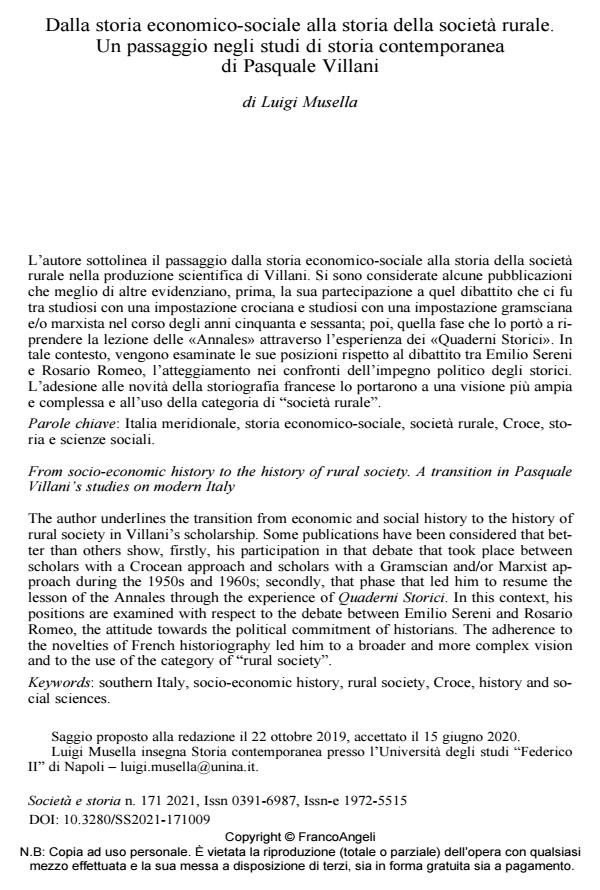From socio-economic history to the history of rural society. A transition in Pasquale Villani’s studies on modern Italy
Journal title SOCIETÀ E STORIA
Author/s Luigi Musella
Publishing Year 2021 Issue 2021/171 Language Italian
Pages 11 P. 175-185 File size 141 KB
DOI 10.3280/SS2021-171009
DOI is like a bar code for intellectual property: to have more infomation
click here
Below, you can see the article first page
If you want to buy this article in PDF format, you can do it, following the instructions to buy download credits

FrancoAngeli is member of Publishers International Linking Association, Inc (PILA), a not-for-profit association which run the CrossRef service enabling links to and from online scholarly content.
The author underlines the transition from economic and social history to the history of rural society in Villani’s scholarship. Some publications have been considered that better than others show, firstly, his participation in that debate that took place between scholars with a Crocean approach and scholars with a Gramscian and/or Marxist approach during the 1950s and 1960s;; secondly, that phase that led him to resume the lesson of the Annales through the experience of Quaderni Storici. In this context, his positions are examined with respect to the debate between Emilio Sereni and Rosario Romeo, the attitude towards the political commitment of historians. The adherence to the novelties of French historiography led him to a broader and more complex vision and to the use of the category of "rural society".
Keywords: Southern Italy, socio-economic history, rural society, Croce, history and social sciences.
- Aymard M. (1986), Pour une continuité de l’histoire rurale, in Villani (a cura di) (1986), pp. 17-30.
- Barral P. (1968), Les agrariens français de Méline à Pisani, Paris, Presses de la Fondation nationale des sciences politiques.
- Bevilacqua P. (1986), Terre comuni e usi civici in Calabria tra fascismo e dopoguerra, in Villani (a cura di) (1986), pp. 389-419.
- Croce B. (19585), Storia del Regno di Napoli, Bari, Laterza.
- Croce B. (1993), L’obiezione contro le «storie dei propri tempi», in Id., Dieci conversazioni con gli alunni dell’Istituto italiano per gli Studi storici di Napoli, Bologna, il Mulino, pp. 137-148.
- Dal Pane L. (1936), Studi sui catasti onciari del Regno di Napoli, Bari, L. Macrì.
- D’Attorre P.P. (1986), La marcia dei rurali. Associazionismo padronale e rappresentanza politica delle élites agrarie padane nel Novecento, in Villani (a cura di) (1986).
- De Rosa L. (1958), Studi sugli arrendamenti del Regno di Napoli. Aspetti della ricchezza mobiliare nel Mezzogiorno continentale (1649-1806), Napoli, L’Arte Tipografica.
- Gerschenkron A. (1965), Il problema storico dell’arretratezza economica, Torino, Einaudi.
- Hubscher R. (1979-1980), L’agriculture et la société rurale dans le Pas-de-Calais du milieu du XIXe siècle à 1914, Arras, Mémoires de la Commission départementale des monumentes historiques du Pas-de-Calais, 2 tomes. Mendras H. (1967), La fin des paysans, innovations et changement dans l’agriculture française, Paris, SEDEIS.
- Puhle H.J. (1975), Politische Agrarbewegungen in kapitalistischen Industriegesellschaften, Göttingen, Vandenhoeck & Ruprecht.
- Puhle H.J. (1975), Agrarische Interessenpolitik und preussischer Konservatismus im wilhelminischen Reich (1893-1914), Bonn-Bad Godesberg, Verlag Neue Gesellschaft GmbH.
- Romano R. (1951), Le commerce du Royaume de Naples avec la France et les pays de l’Adriatique au XVIIIᵉ siècle, Paris, Ecole Pratique des Hautes-Etudes, Centre de recherches historiques.
- Romano R. (1978), La storiografia italiana oggi, Roma, L’Espresso.
- Romeo R. (1950), Risorgimento in Sicilia, Bari, Laterza.
- Sereni E. (1947), Il capitalismo nelle campagne (1860-1900), Torino, Einaudi.
- Venturi F. (1954), La circolazione delle idee, in «Rassegna Storica del Risorgimento», pp. 203-222.
- Venturi F. (1959), Alle origini dell’illuminismo napoletano (Dal carteggio di Bartolomeo Intieri), in «Rivista Storica Italiana», pp. 416-456.
- Venturi F. (1960), Galiani tra enciclopedisti e fisiocrati, in «Rivista Storica Italiana», pp. 15-63.
- Venturi F. (1960), L’illuminismo nel Settecento europeo, XIᵉ Congrés International des Sciences Historiques, Rapports, IV, Stockholm.
- Villani P. (1962), Mezzogiorno tra riforme e rivoluzione, Bari, Laterza.
- Villani P. (1966), Il capitalismo agrario in Italia (sec. XVII-XIX), in «Studi storici», VII, 1966, n. 3, pp. 471-513.
- Villani P. (a cura di) (1986), Trasformazioni delle società rurali nei paesi dell’Europa occidentale e mediterranea (secolo XIX-XX). Bilancio degli studi e prospettive di ricerca, Napoli, Guida editori.
- Villani P. (1990), L’eredità storica e la società rurale, in Storia d’Italia. Le regioni dall’Unità a oggi. La Campania, a cura di P. Macry e P. Villani, Torino, Einaudi.
- Villari R. (1961), Mezzogiorno e contadini, Bari, Laterza.
- Weber E. (1989), Da contadini a francesi. La modernizzazione della Francia rurale 1870-1914, , Bologna, il Mulino.
Luigi Musella, Dalla storia economico-sociale alla storia della società rurale. Un passaggio negli studi di storia contemporanea di Pasquale Villani in "SOCIETÀ E STORIA " 171/2021, pp 175-185, DOI: 10.3280/SS2021-171009